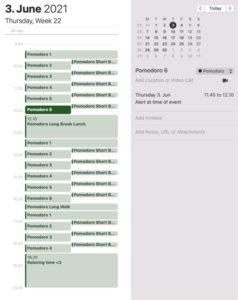
I was writing my master’s thesis at exactly this time last year. I planned to complete the thesis within six months due to my scholarship restrictions. Finally, I managed to submit my thesis six months later just two days before my birthday. It was such a relief!
It was not an easy process for me, especially since I did not have to write a thesis for my bachelor’s studies in Turkey. I understand completely how hard and big of a task writing a thesis appears to be. It was hard for me to start the thesis writing process, but I finally made it! Therefore, I wanted to share my experience to other students, who are in the process of writing their thesis.
When I was writing my thesis, I used the pomodoro technique.
Some of you might have heard about this technique before. I did not know about it before I read the university’s study tips on their intranet site. I read that it is good if you are struggling with procrastination, so it rang a bell to me. You can also find more information about time management on Nyyti’s website and a presentation of the pomodoro technique on e.g., the Todoist site.
In this blog post, I would like to share my experience in writing my thesis with the method inspired by the pomodoro technique. I found the technique very useful to me because I notice that my mind tends to wander when doing tasks, such as to my phone, relationships, the things going on outside, or other things. When I dedicate a certain amount of time reserved for a task, I know that I will be able to do anything I want once I have completed my working hours.
Work as if you are a full-time employee
I had a goal to enter working life after graduation and that I am used to the daily grind of full-time work. In my opinion, the thesis writing process could be a good time to get used to the working life. This way of thinking motivated me. Personally, I am interested in research work and the academic field fascinates me.
When I was writing my thesis, I imagined myself as a doctoral student at the university. In my mind, I had a research project funded by an external party and that the funding ends in the summer. By thinking that the thesis writing process would benefit in your career, you may feel that you are doing something good for yourself and that you are taking concrete steps in achieving your goals. This allowed me to cope with the tight schedules during my thesis writing period.
In Finland, full-time employees usually work 7.5 hours per day. Because of this, I arranged my schedule so that I work 7.5 hours per day on my thesis, the same length as a full-time worker’s.
The pomodoro technique divides the working time into 25-minute sessions. In between each pomodoro session, you have a small 5-minute break. The technique recommends having a longer break after four working sessions. This way, if you are working 7.5 hours in a day, you would have 15 pomodoro sessions in a day.
The original pomodoro technique uses a kitchen timer. The Italian founder’s kitchen timer was in a form of a tomato (or “pomodoro” in Italian). You may also use a digital timer that can be found from the internet, your phone, or computer. You can also find a lot of pomodoro-named apps online that you could download to your phone or computer. My computer’s integrated calendar app works best for me. I created the events so that I am alerted at the start of every event. You may see how my calendar looks below.

Image 1 This is how my calendar looked like in a day
In my experience, you can adjust the duration and the amount of pomodoro sessions according to your needs. I had thought that I have a short attention span, so I tried having shorter pomodoro sessions which lasts for 20 minutes. Then I noticed that I still had a good workflow at 20 minutes and the break notification interrupted that. Later, I decided that 25 minutes was a good focusing time.
Furthermore, I had 16 pomodoro sessions instead of fifteen. I still had the energy to do one more pomodoro session because of my long breaks. Differently from the pomodoro technique suggestion, I took my long break after six sessions. I decided to do that due to the nature of research work which requires more concentration time, and I did not want to interrupt my good workflow.
Develop self-discipline
One important thing to consider is to develop self-discipline. The most difficult thing for me was to get out of my comfortable bed. My schedule would work well if I started working before 10 because I wanted to complete six pomodoro sessions — or three hours of work — before the lunch break. I was writing my thesis at the university’s library, and I was going to the university’s cafeterias for lunch. The cafeterias’ lunch time ends between 13.30-15.00 and I wanted to be able to have lunch there.
Because of my morning routine and travel takes time, I spared 1.5 hours between the time I get out of bed and the time I start work. This depends on your morning routine. I also have a habit of using my phone in the mornings. I reserve a time for this too, for half an hour. It had been nice if I was already able to get up before the whole thirty minutes, and not more. You might not need to use the whole thirty minutes.
Remember to develop self-discipline and know that you would be able to do anything you would like to do when your day ends.
Enough breaks
During breaks, it is worthwhile to spend it for something good for your physical and mental health. In the short breaks, I did something other than seeing the computer screen. The activities that I did during the five-minute breaks were using the bathroom, checking my phone while standing up, stretching, seeing outside the window, getting fresh air outside the door, doing small house chores, dancing, and singing while listening to music, even watching five-minute Zumba videos on YouTube. In my long breaks, I preferred taking walks. Otherwise, I would sometimes go to the shop to grab some healthy snacks or take a short nap.
I spent my free time with social activities.
When going to the university restaurant, I would eat with a friend when possible. In the evenings, I like to spend time with my boyfriend, watch my favorite shows on TV, and eat nice food. During my free days, I liked to see my friends and did some fun activities. I went to sleep at the same time every day, even when I had a day off. This helped me a lot in rhythmizing my schedule.
In my thesis writing process, I noticed that the sense of hurry, accumulated work stress, and being physically passive from working in the computer gave me headaches and muscle stiffness. Getting a massage helped me to relax and ease the muscle tension. Everybody has their different ways in managing stress. However, paying attention to physical and mental wellbeing is important because it helps in relieving stress. Doing fun, social, and physical activities were important to me. Besides, I appreciated having feedback from others about my thesis. I looked forward to the discussions with my thesis supervisor. I also asked another teacher and my friends to read my thesis.
Conclusion
These were my experiences in writing a master’s thesis. When writing a thesis, it is important to keep in mind that continuity is the nature of research work and that you are one experience new. I read a good question on Aalto University’s Doctoral Studies at the School of Business page. There it asks, “Are you willing to dedicate most of your daily time awake for a single purpose?”.
I hope that this blog post might help you in time management during the thesis writing process. I was very relieved when I submitted my thesis on time and my calendar was free from daily pomodoro events.
It makes me smile a little when seeing a pack of conserved tomatoes. It reminded me of the times when my days were filled with Italian tomatoes.

Leave a Reply